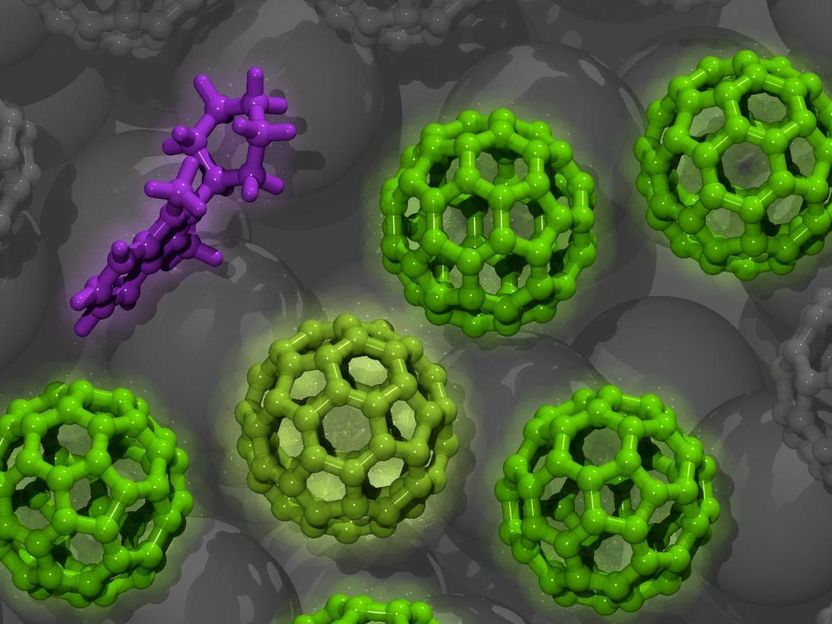Electrical conductivity in doped organic semiconductors deciphered
organic semiconductors enable the fabrication of large-scale printed and mechanically flexible electronic applications, and have already successfully established themselves on the market for displays in the form of organic light-emitting diodes (OLEDs). In order to break into further market segments, however, improvements in performance are still needed. Doping is the answer. In semiconductor technology, doping refers to the targeted introduction of impurities (also called dopants) into the semiconductor material of an integrated circuit. These dopants function as intentional "disturbances" in the semiconductor that can be used to specifically control the behaviour of the charge carriers and thus the electrical conductivity of the original material. Even the smallest amounts of these can have a very strong influence on electrical conductivity. Molecular doping is an integral part of the majority of commercial organic electronics applications. Until now, however, an insufficient fundamental physical understanding of the transport mechanisms of charges in doped organic semiconductors has prevented a further increase in conductivity to match the best inorganic semiconductors such as silicon.

Illustration of an organic semiconductor layer (green molecules) with dopant molecule (purple).
Sebastian Hutsch, Frank Ortmann
Researchers from the Dresden Integrated Center for Applied Physics and Photonic Materials (IAPP) and the Center for Advancing Electronics Dresden (cfaed) at TU Dresden, in cooperation with Stanford University and the Institute for Molecular Science in Okazaki, have now identified key parameters that influence electrical conductivity in doped organic conductors. The combination of experimental investigations and simulations has revealed that introducing dopant molecules into organic semiconductors creates complexes of two oppositely charged molecules. The properties of these complexes like the Coulomb attraction and the density of the complexes significantly determine the energy barriers for the transport of charge carriers and thus the level of electrical conductivity. The identification of important molecular parameters constitutes an important foundation for the development of new materials with even higher conductivity.
While the experimental work and a part of the simulations were conducted at the IAPP, the Computational Nanoelectronics Group at the cfaed under the leadership of Dr. Frank Ortmann verified the theoretical explanations for the observations by means of simulations at the molecular level. In doing so, a comprehensive foundation for new applications for organic semiconductor technology has been created.
Original publication
Martin Schwarze, Christopher Gaul, Reinhard Scholz, Fabio Bussolotti, Andreas Hofacker, Karl Sebastian Schellhammer, Bernhard Nell, Benjamin D. Naab, Zhenan Bao, Donato Spoltore, Koen Vandewal, Johannes Widmer, Satoshi Kera, Nobuo Ueno, Frank Ortmann & Karl Leo; "Molecular parameters responsible for thermally activated transport in doped organic semiconductors"; Nature Materials; 2019
Most read news
Original publication
Martin Schwarze, Christopher Gaul, Reinhard Scholz, Fabio Bussolotti, Andreas Hofacker, Karl Sebastian Schellhammer, Bernhard Nell, Benjamin D. Naab, Zhenan Bao, Donato Spoltore, Koen Vandewal, Johannes Widmer, Satoshi Kera, Nobuo Ueno, Frank Ortmann & Karl Leo; "Molecular parameters responsible for thermally activated transport in doped organic semiconductors"; Nature Materials; 2019
Topics
Organizations
Other news from the department science

Get the chemical industry in your inbox
By submitting this form you agree that LUMITOS AG will send you the newsletter(s) selected above by email. Your data will not be passed on to third parties. Your data will be stored and processed in accordance with our data protection regulations. LUMITOS may contact you by email for the purpose of advertising or market and opinion surveys. You can revoke your consent at any time without giving reasons to LUMITOS AG, Ernst-Augustin-Str. 2, 12489 Berlin, Germany or by e-mail at revoke@lumitos.com with effect for the future. In addition, each email contains a link to unsubscribe from the corresponding newsletter.



























































